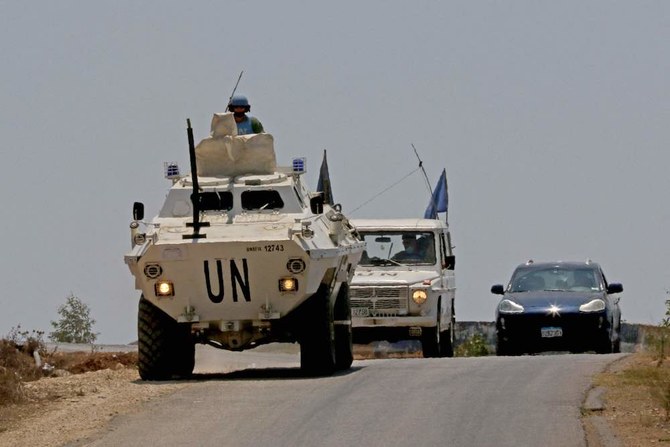BEIRUT: Authorities in Lebanon on Thursday condemned airstrikes carried out by the Israeli Air Force, the first in seven years to target Lebanese villages along the border.
The United Nations Interim Force in Lebanon (UNIFIL), which has been deployed in the country since 1978 and has patrolled the border since the 2006 conflict between Lebanon and Israel, said both countries should “act with urgency” to de-escalate tensions.
Following a complaint lodged by Lebanon, UNIFIL has launched an investigation into violations of UN Security Council Resolution 1701 in southern Lebanon in the past 48 hours. Resolution 1701 was adopted as part of the efforts to end the 2006 war.
Candice Ardell, the deputy director of UNIFIL’s media office, said that at dawn on Thursday “UNIFIL peacekeepers heard powerful explosions near Tyre and Marjeyoun and Mahmoudiya in the south of Lebanon.”
She added that Maj. Gen. Stefano Del Col, commander of the UNIFIL peacekeeping forces, led a tripartite meeting with senior officers from the Lebanese Armed Forces and the Israel Defense Forces at a UN facility in Ras Al-Naqoura. Del Col urged both sides to “use this trilateral forum to explore ways to reinforce security and stability along the Blue Line.”
The Israeli attacks came after three rockets were launched from Lebanese territory on Wednesday by unknown forces. Two of them fell on the Israeli city of Kiryat Shmona. The Israeli response set fire to crops.
Lebanese President Michel Aoun described the Israeli strikes as “a flagrant and dangerous violation of UN Security Council Resolution 1701, and a direct threat to the security and stability in the south.”
He said that they indicate “escalatory and hostile intentions that coincide with the continuing threats against Lebanon and its sovereignty” and added: “Filing a complaint to the UN is a necessary step to deter Israel from continuing its attacks on Lebanon.”
Caretaker Prime Minister Hassan Diab said he had instructed Lebanon’s Permanent Representative to the UN Amal Mudallali to lodge an urgent complaint with the Security Council about the Israeli aggression.
“Israel’s excuse for its explicit hostile attack against the Lebanese sovereignty was the suspicious rockets that fell north of the Occupied Palestinian Territories, fired from Lebanese territories, while nobody claimed responsibility for them,” Diab added.
The attack is the latest in a long series of Israeli violations of Lebanese sovereignty, including the use of Lebanese airspace to carry out attacks in Syria.
Lebanon has been without a proper government for a year now. The previous authority, led by Diab, resigned on Aug. 10 last year, six days after the devastating explosion at Beirut’s port.
After his fifth meeting with Aoun at the presidential palace, recently appointed PM-designate Najib Mikati on Thursday said he felt optimistic about the prospect of reaching an agreement on the formation of a new government. He said the process was proceeding “at a slow pace but they are definitely determined to form a government.”
He added: “I do not have a deadline but I will not leave the time frame open. Today’s session is a positive step forward. The parliamentary elections alone will decide the future of Lebanon.”
A general election is scheduled to take place in May next year.
Regarding developments on Wednesday at an international conference to support Lebanon, which was co-convened by France and the UN, Mikati said: “France was clear that no support will be provided before the formation of a government.”
Thirty-three countries and 10 international organizations took part in the conference. The participants urged Lebanese authorities “to urgently form a rescue cabinet to carry out reforms and save the country from collapse.”
They agreed that aid will be provided “directly to the people of Lebanon, without having to go through governmental institutions.”
The US State Department said late on Wednesday: “Lebanon’s leaders must support, without any delay, the formation of a new government capable of carrying out the reforms that are long overdue.”
US Secretary of State Antony Blinken criticized “a collective failure on the part of those who call themselves leaders in Lebanese society.”
He added: “A true leader should show flexibility and leadership skills by putting the interests of their people first. We have not seen Lebanese officials do that for a while now, as Lebanon has been without a government for a year. It is time for that to change. It is time for Lebanese officials to do the right thing.
“There are means to hold those responsible for this situation to account,” he said, referring to EU sanctions.

























